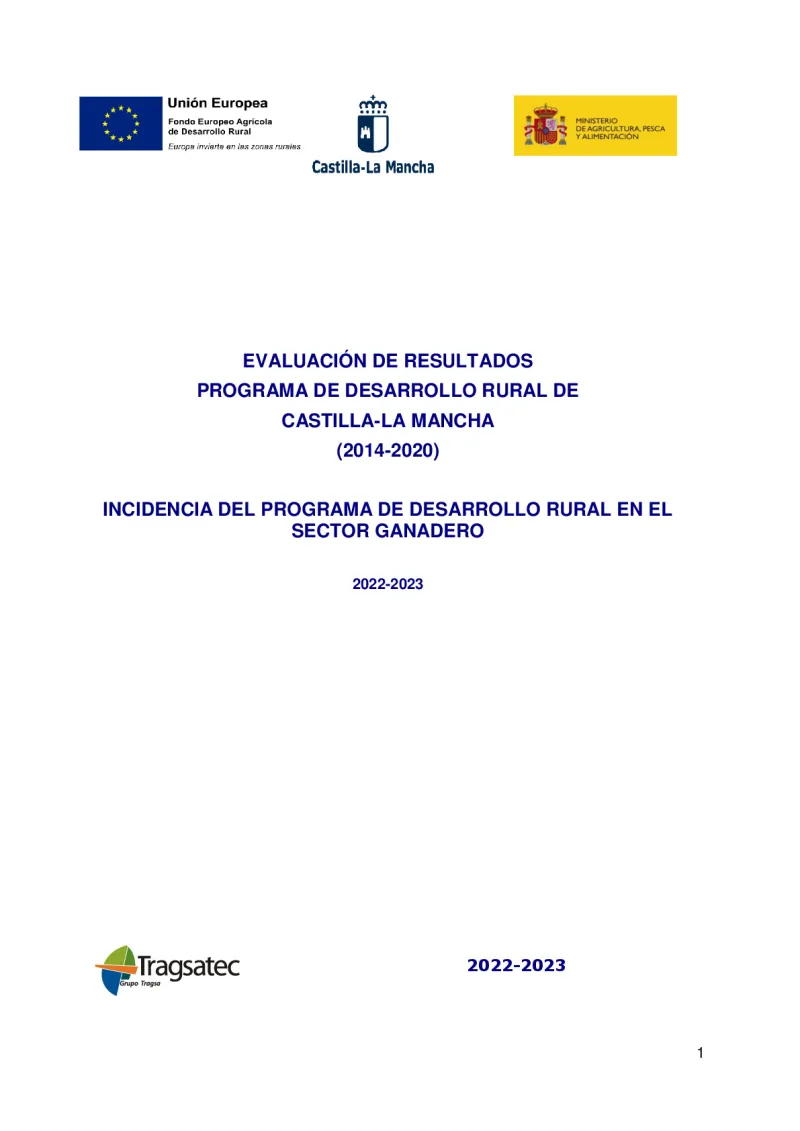Impact of the Rural Development Programme on the livestock sector of Castilla la Mancha
- Evaluation
- Environment
- Agricultural Productivity
- Climate and Climate Change
- Sustainability
- Evaluation
The livestock sector is relevant to Castilla-La Mancha and is therefore supported in its Rural Development Programme, with the aim of enhancing both competitiveness and sustainability.
- Spain
- 2014-2022
- Environmental impacts

This is a thematic evaluation report of the 2014-2020 Rural Development Programme (RDP), assessing the impact of the RDP on the livestock sector since the programme's inception. The livestock sector is relevant to Castilla-La Mancha and is therefore supported in the RDP, with numerous measures in place to promote its development, aiming to boost both competitiveness and sustainability.
Considering the significance of the livestock sector in the RDP strategy, the objective of this evaluation activity was to assess the impact of RDP measures on the competitiveness of the livestock sector, the related food chain and the environment.
The methodological approach is a combination of both quantitative and qualitative methods. In the early stages, a quantitative analysis was conducted based on the data from the support files, complemented by the results of surveys conducted among the beneficiaries of the aid. The qualitative analysis has been used to gather information about how and why the RDP has been effective, as well as to identify possible indirect or unexpected effects.
The quantitative analysis is based on the Common Monitoring and Evaluation Framework (CMEF) indicators (result indicators R1, R3, R4, and targets T3, T4, T5, T6, T9, T12, T16) and a list of approximately 20 additional indicators.
The analysis tries to respond to the following evaluation questions: (1) To what extent has the RDP affected the competitiveness of the livestock sector?; (2) To what extent has the RDP affected the food chain linked to the livestock sector?; and (3) To what extent has the RDP affected the environment and climate change through the livestock sector?
The main problems encountered in the development of this evaluation were motivated by an overload of work (evaluation activities overlap with other usual tasks of the actors involved, with the administration staff especially overburdened) and by the fact that information on beneficiaries from the previous period has not been taken into account. Additionally, survey responses provide qualitative information and relative trends, partly due to the relatively low response rate.
RDP support has been crucial for the sector in recent years, as the increase in input prices, the challenges posed by climate change and reduced consumption due to the pandemic have had a negative impact.
Measures related to the livestock sector are different, such as: training and advice, promotion of quality schemes, investments in farm modernisation and restructuring and in boosting the food agribusiness, incorporation of young farmers through the creation of companies, or the promotion of sustainable practices and animal welfare in the livestock sector.
Training activities addressing various aspects of livestock production have been promoted, including topics such as animal welfare, beekeeping, grazing, cheesemaking, dairy products and organic livestock.
The RDP support has helped modernise 468 livestock farms, with 61.2% of young people and 19.4% of women involved, and has created 662 livestock companies founded by young people, of which women lead 32%.
The modernisation of 109 agri-food industries has been supported, mobilising an investment of EUR 223 652 902.90. 6.3% of the operations have been aimed at productions with a differentiated quality figure, either organic production or another different figure.
Innovation has been present in 12.6% of farm investments. 26% of young people who have created companies have applied innovations on their farms, and 27% information and communication technologies (ICT).
The RDP has impacted the livestock-linked food chain by supporting participation in quality schemes or organic livestock farming. Promotion actions have also been supported to encourage the consumption of products with differentiated quality.
In addition to the aforementioned organic livestock, biodiversity has been supported through initiatives such as beekeeping activities, the maintenance of endangered native breeds and the promotion of extensive grazing.
Animal welfare has also been supported in 1 657 farms, promoting competitiveness, better quality control and productive performance, as well as a lower use of antibiotics.
The boost in economic activity in the agricultural sector has had an impact on population fixation, as reflected in the relatively high proportions of beneficiaries residing in municipalities with extreme or intense depopulation (70.4% of young people who have created a company, 53.8% of owners who have modernised their holding, 71.51% of beekeeping farms, 74% of beneficiaries of aids to extensive grazing, 67.81% of organic farmers and 75.61% of beneficiaries of animal welfare support).
Author(s)
Tragsatec